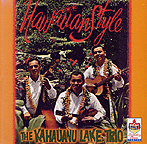 Kahauanu Lake "Hawaiian Style" (Hula Records, 1964)
Kahauanu Lake "Hawaiian Style" (Hula Records, 1964)
A popular lounge performer, ukulele player Kahauanu Lake led a trio that serenaded guests at the Royal Hawaiian Hotel in Waikiki throughout the 1950s, '60s, and beyond. The playing on this disc -- a reissue of an LP cut back in '64 -- is smooth and serene, yet also authentic and quite satisfying. There's a little bit of an old-school pop vocals/barbershop feel to the arrangements and vocals, but overall this is quite nice and melodically rich. Definitely worth checking out, and a notch or two above most of the old souvenir albums that came out of the islands back in the old days... Give it a shot!
Kahauanu Lake "The Best Of The Kahauanu Lake Trio, v.1" (Navarre/Surfside Records, 1992)
Kahauanu Lake "The Best Of The Kahauanu Lake Trio, v.2" (Navarre/Surfside Records, 1994)
Kahauanu Lake "Hapa-Haole Hulas" (Hula Records)
 Melveen Leed "Hawaiian Country" (Lehua Records, 1975)
Melveen Leed "Hawaiian Country" (Lehua Records, 1975)
 Melveen Leed "Hawaiian Country Girl" (Lehua Records, 1976) (LP)
Melveen Leed "Hawaiian Country Girl" (Lehua Records, 1976) (LP)
 Melveen Leed "Hawaiian Country Hits" (Lehua Records, 1976) (LP)
Melveen Leed "Hawaiian Country Hits" (Lehua Records, 1976) (LP)
 Melveen Leed "Melveen With The Best Of Slack Key" (Surfside Hawaii, 1980) (LP)
Melveen Leed "Melveen With The Best Of Slack Key" (Surfside Hawaii, 1980) (LP)
Although this disc does indeed feature contributions from several of the all-time greatest slack-key guitarists -- Sonny Chillingsworth, Atta Isaacs, Ledward Kaapana, Gabby Pahinui -- this is hardly a slack-key lovers dream record. Instead, gloopy pop stylings, with strings arrangements and sluggish tempos, dominate. There are many classic tunes on here as well, and while on occasion Leed sings in a more or less straightforward traditional style, more often she pushes into more tenuous terrain, incorporating mainstream, Vicki Carr-ish pop vocal techniques into the repertoire, and more often than not, these overwhelm the original material.
 Melveen Leed "A Part Of Me, A Part Of You" (Lehua Records)
Melveen Leed "A Part Of Me, A Part Of You" (Lehua Records)
 Bill Ali'iloa Lincoln "Hawaii's Falsetto Poet" (Hana Ola Records, 1997)
Bill Ali'iloa Lincoln "Hawaii's Falsetto Poet" (Hana Ola Records, 1997)
Lovely stuff from hula teacher, club performer and multi-instrumentalist Bill AliÕiloa Lincoln (1911-1989) a legendary falsetto singer with an amazing range, beautiful tone and a very evocative presence. Born on the Big Island, Lincoln moved to Oahu in his teens and quickly rose into the upper echelons of Honolulu's nightlife, starting as a protege of bandleader Johnny Kameaaaloha Almeida, who made him a featured performer on his live stage and radio shows during the 1930s. Bill Lincoln formed his own band in 1938 and worked steadily before, during and after the war, and was the first artist to record for the newly-formed Bell Records, beginning in 1944. He recorded countless singles and numerous albums on the Bell, Waikiki and Tradewinds labels, including the rarities heard on this generously-programmed twenty-song retrospective. The collection starts off with Lincoln's first recording, a 1938 transcription-disc rendition of "Ku'u Lei Liliha," made with John Almeida's band, contrasted with a second version recorded in 1945 with Lincoln's own band. Every track on this disc is a pure delight, from beginning to end, exactly the sound and style I think of when seeking the drifting, romantic sound of Hawaiian music's golden era -- all those other zippy trick guitar tunes and novelty-lyric hapa haole songs are fun, sure, but this tradition, of graceful, evocative Hawaiian-language vocals and laid-back, chiming steel guitar, is absolute heaven. And no matter how many times I hear him sing, it's always blows my mind that it's man, not a woman, behind that microphone. What a voice!
 Loma "Eddie Lund Presents Loma, Avec Ses Copains" (Tahiti Records, 1967-?) (LP)
Loma "Eddie Lund Presents Loma, Avec Ses Copains" (Tahiti Records, 1967-?) (LP)
One of several "girl" singers who worked with Eddie Lund in the 1960s; the mononymic Loma is backed here by several musicians also in Lund's orbit, notably bass player Makitou and guitarist Remy, who also recorded with her on several albums as Les Barefoot Boys.
 Eddie Lund "Echoes From A Distant Lagoon" (Viking Records, 1961-?) (LP)
Eddie Lund "Echoes From A Distant Lagoon" (Viking Records, 1961-?) (LP)
Songwriter and bandleader Eddie Lund (1909-1973) was an American expatriate who moved from the Pacific Northwest to the warmer climes of Tahiti back in the late 1930s. Writing in French, English and Tahitian, he was a remarkably prolific composer and is credited as helping define the modern popular music of the islands, and helping create the record industry in his adoptive land. Lund led his own group, Eddie Lund & The Tahitians and fostered the talents of countless performers, including the numerous singers and instrumentalists who populated his band and its spinoffs.
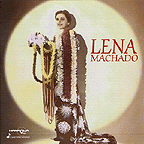 Lena Machado "The Hawaiian Songbird" (Hana Ola Records, 1997)
Lena Machado "The Hawaiian Songbird" (Hana Ola Records, 1997)
One of Hawaii's greatest singers of the pre- and post-WWII era, Honolulu's Lena Machado (1903-74) was a master of the leo ki'eki'e (falsetto) singing style... The "songbird" nickname is pretty apt; some folks may find the falsetto vocals offputting, but within the style, it doesn't get much better than this. Machado became famous as a radio singer and nightclub performer starting in the early 1920s, and was one of Hawaii's best-beloved singers for the next four decades. Machado worked with Hawaii's musical elite: in her early career she worked with hotshot guitarists Sol K. Bright and Sol Hoopii, as well as bandleader Lani Macintyre; after World War Two, her band featured slack-key guitar legend Gabby Pahinui. This collection reissues in its entirety Machado's self-released1962 LP, along with five other songs that give a tantalizing hint of what she sounded like in her early years. Again, the flowery, old-fashioned style might not be for everybody, but this is the kind of record that, if you give it half a chance, can really grow on you. Check it out!
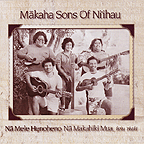 Makaha Sons Of Ni'ihau "Na Mele Henoheno: Cherished Songs Of The Early Years" (Poki Records, 1999)
Makaha Sons Of Ni'ihau "Na Mele Henoheno: Cherished Songs Of The Early Years" (Poki Records, 1999)
Selections from three early albums, No Kristo (recorded in 1976), Kahea O Keale (1977), and Ke'ala from 1978. This set includes some of the first recorded work from the late Israel Kamakawiwo'ole (aka "IZ"), who became one of Hawaii's most popular artists. The Makaha Sons drew on the musical traditions of the island of Ni'ihau, the so-called "forbidden island," off the shores of Kauai, where by law only native-born Hawaiians can own land, and foreigners can only visit under strict regulation. The group's warm vocal style and large, dynamic sound incorporated some of the feel of mainland folk music, but little of the cloying, mellowness that came to drag the folk scene down. They also bridged several styles of island music -- galloping '30s-style acoustic music, along with elegant slack key, and dreamy group vocals. They were clearly influenced by groups like Gabby Pahinui's Sons Of Hawaii and the more youth-oriented Sunday Manoa, but the Makaha band had its own magical sound, and this retrospective captures it well... It's lively yet relaxed, heartfelt and innovative, and filled with unusual, distinctive instrumental arrangements. Nice stuff... highly recommended!
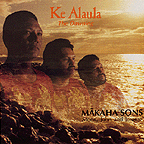 Makaha Sons Of Ni'ihau "Live At Hank's Place" (Surfside Records, 1995)
Makaha Sons Of Ni'ihau "Live At Hank's Place" (Surfside Records, 1995)
 Makaha Sons "Ke Alaula - The Dawning" (Poki Records, 1994)
Makaha Sons "Ke Alaula - The Dawning" (Poki Records, 1994)
The post-IZ remnants of the original Makaha Sons ensemble -- a trio including Louis Moon Kauakahi, Jerome K. Koko and John K. Koko -- many years later and with a too-sweet, vocal-based, folk revival-ish set... DidnÕt really do much for me, though I suppose it's okay.
Makapuu Sand Band "Makapuu Sand Band" (Mele/Hana Ola Records, 1992)
(Produced by Irv Pinensky)
A lovely, soulful Hawaiian revival band of the late 1970s, the Makapuu Sand Band was a talented quartet that featured the steel guitar of Andrew Iaukea Bright, who was (I believe) the nephew (or grand-nephew?) of legendary songwriter/guitarist Sol K. Bright, who wrote the hapa haole classics "Hawaiian Cowboy" and "Hawaiian Scotsman." As their name implied, the Sand Band was a Hawaiian party band, at home on the beaches with their guitars in hand... These gentle acoustic tunes are similar in feel to the Sons Of Hawaii or the early Peter Moon Band. Nice stuff!
Makapuu Sand Band "Winds Of Waimanalo" (Hana Ola Records, 2004)
Doug & Sandy McMaster "Hanalei Sunset" (Aloha Plenty Records, 1998)
Doug & Sandy McMaster "Kauai Homecoming" (Aloha Plenty Records, 2000)
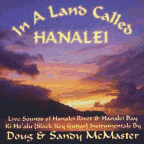 Doug & Sandy McMaster "In A Land Called Hanalei" (Aloha Plenty Records, 2001)
Doug & Sandy McMaster "In A Land Called Hanalei" (Aloha Plenty Records, 2001)
Dunno much about these folks... but this is a nice, mellow set of slack key 'n' acoustic noodling instrumentals, by some locals in Hanalei, Hawaii. This CD was in the stereo at our friend's house on Kauai, and it was as lovely a soundtrack to listen to while watching the misty clouds on the Northern Shore as any of the albums I had brought with me. The label can be reached at: http://www.alohaplentyhawaii.com, or e-mailed at: aplenty@gte.net.
Doug & Sandy McMaster "Slack Key Story" (Aloha Plenty Records, 2002)
Doug & Sandy McMaster "Green Flash Slack Key" (Aloha Plenty Records, 2004)
Doug & Sandy McMaster "Hawaiian Slack Key Guitar & Ukulele Sampler" (Aloha Plenty Records, 2004)
Doug & Sandy McMaster "Hanalei Tradition" (Aloha Plenty Records, 2007)
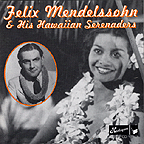 Felix Mendelssohn "...And His Hawaiian Serenaders" (Harlequin Records, 1997)
Felix Mendelssohn "...And His Hawaiian Serenaders" (Harlequin Records, 1997)
A British "sweet band" entrepreneur who got the Hawaiian bug in the late '30s, Felix Mendelssohn helped popularize the style throughout the UK and Europe in the wartime era. Mendelssohn himself was not a musician, or even a singer, but he recruited the best talent available and these recordings are a great mix of pleasantly corny, genteel big band and authentic slack-key steel stylings. Recommended!
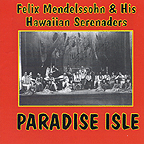 Felix Mendelssohn "Paradise Isle" (Harlequin Records, 2001)
Felix Mendelssohn "Paradise Isle" (Harlequin Records, 2001)
This second disc covers the latter half of Mendelssohn's career, when he found great renown, and great disappointment, leading a large (and quite costly) Hawaiian orchestra across the UK and Europe during the late 1940s. Included here are deleriously detailed liner notes from erstwhile bandmember, steel guitarist Kealoha Life, who recounts in great minutiae all the ups and downs of Mendelssohn's lavish stage show. The music itself is great -- pure dance band material, but with fine, understated steel guitar work and a flawless repertoire. Among the many musicians in the Mendelssohn entourage, Tau Moe and his family also made their mark in the postwar era. Mendelssohn, sadly, died young in the early 1950s, but as this disc amply demonstrates, he left behind a lot of great music. Definitely worth tracking down.
Felix Mendelssohn "Dreams Of Hawaii" (Jasmine Records, 1999)
Felix Mendelssohn "We Got Rhythm: The Swing Side Of The Serenaders" (Jasmine Records, 2002)
Felix Mendelssohn "...& His Hawaiian Serenaders" (Castle Records, 2004)
A 2-CD set.
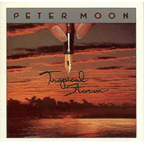 Peter Moon "Tropical Storm" (Panini Records, 1979)
Peter Moon "Tropical Storm" (Panini Records, 1979)
(Produced by Steve Siegfried, Witt Shingle & Lawrence Brown)
The first solo Hawaiian pop modernist Peter Moon, who started his career playing with the Cazimero Brothers and the Sunday Manoa band, and took a five-year break between that gig and the release of this landmark album. This is a bright, playful album, mixing dazzling acoustic guitar picking with uptempo pop-folk -- Moon gets both styles just right, blending the mellow island vibe with a hip, modern sensibility, but very little in the way of the gooey pop crossovers that later came to weight Hawaiian pop down. There's some traditional stuff here, with sweet slack key and steel guitar work, as well as several jaunty, rock-influenced uptempo acoustic tunes, such as the playful "Island Love," which kicks off this collection off. Moon sings in both English and Hawaiian, and mixes in a little bit of Dan Hicks-ish acoustic swing, as well as a mellow, hippie-ish vibe on tunes like "Ballad Of Keawaiki." Fun stuff -- a nice sampling of what the younger set came up with after the first flowering of the Hawaiian music revival. Recommended!
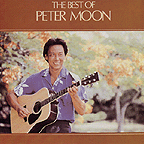 Peter Moon "The Best Of Peter Moon" (Panini Records, 1981)
Peter Moon "The Best Of Peter Moon" (Panini Records, 1981)
This compilation came out not long after Moon's breakthrough album, Tropical Storm, and almost all the material on here comes from that record. Either one is a good introduction to Moon's work, although this one includes a song on here I just couldn't stand -- the syrupy pop tune, "A Hawaiian Lullaby" -- which of course was a very popular song at the time. Other than that, though, this is pretty groovy. Definitely worth checking out.
Sterling Mossman "Happy In Hawaii" (Decca, 1959) (LP)
Book 'em, Danno! Sterling Edwin Kilohana Mossman, a Honolulu police officer by day, amiable hapa haole musical star by night, was known by the nickname, "The Hula Cop," and held down a residency at Waikiki's Queen's Surf restaurant for most of the 1950s and '60s. And he actually did appear on Hawaii Five-O, playing music on the pilot episode, as well as making an appearance on the earlier island cop show, Hawaiian Eye. As far as I know, these two releases on Decca were the only albums he recorded, though I'd be glad to pass along any other info folk out there could share...
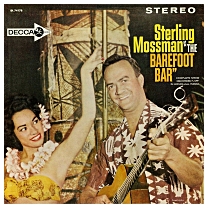 Sterling Mossman "At The Barefoot Bar" (Decca Records, 1962) (LP)
Sterling Mossman "At The Barefoot Bar" (Decca Records, 1962) (LP)
Book 'em, Danno!
Sterling Mossman & His Barefoot Group "Host In Hawaii (Lokey's Luau)" (Capitol Custom, 1962) (LP)
Apparently this was a "custom" release -- a few hundred copies were pressed by Capitol Records, but only given out to people connected to Earl Thacker's T-Bar Ranch House. Can you say "hapa haole Holy Grail?" Sure you can. The band is pretty much the same as on the Barefoot Bar album released the same year... Barney Isaacs, Norman Isaacs, Veroa Tiki, et.al.
 Kahauanu Lake "Hawaiian Style" (Hula Records, 1964)
Kahauanu Lake "Hawaiian Style" (Hula Records, 1964)
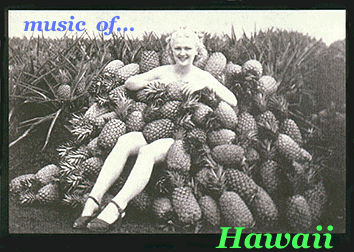
 Lena Machado "The Hawaiian Songbird" (Hana Ola Records, 1997)
Lena Machado "The Hawaiian Songbird" (Hana Ola Records, 1997)
 Makaha Sons Of Ni'ihau "Na Mele Henoheno: Cherished Songs Of The Early Years" (Poki Records, 1999)
Makaha Sons Of Ni'ihau "Na Mele Henoheno: Cherished Songs Of The Early Years" (Poki Records, 1999)
 Makaha Sons "Ke Alaula - The Dawning" (Poki Records, 1994)
Makaha Sons "Ke Alaula - The Dawning" (Poki Records, 1994)
 Doug & Sandy McMaster "In A Land Called Hanalei" (Aloha Plenty Records, 2001)
Doug & Sandy McMaster "In A Land Called Hanalei" (Aloha Plenty Records, 2001)
 Felix Mendelssohn "...And His Hawaiian Serenaders" (Harlequin Records, 1997)
Felix Mendelssohn "...And His Hawaiian Serenaders" (Harlequin Records, 1997)
 Felix Mendelssohn "Paradise Isle" (Harlequin Records, 2001)
Felix Mendelssohn "Paradise Isle" (Harlequin Records, 2001)
 Peter Moon "Tropical Storm" (Panini Records, 1979)
Peter Moon "Tropical Storm" (Panini Records, 1979)
 Peter Moon "The Best Of Peter Moon" (Panini Records, 1981)
Peter Moon "The Best Of Peter Moon" (Panini Records, 1981)
 Sterling Mossman "At The Barefoot Bar" (Decca Records, 1962) (LP)
Sterling Mossman "At The Barefoot Bar" (Decca Records, 1962) (LP)


